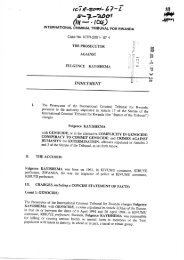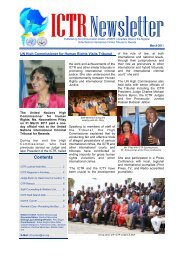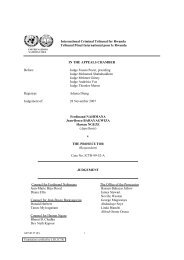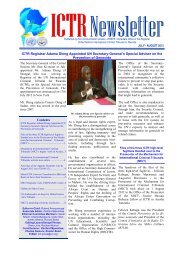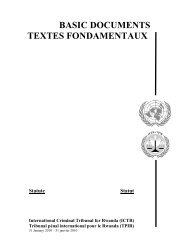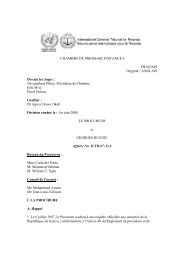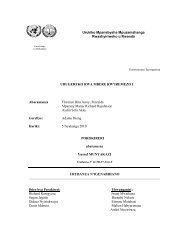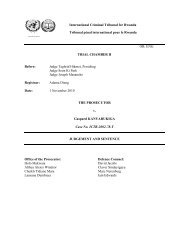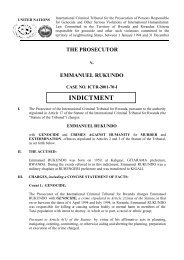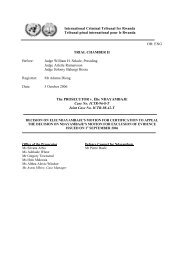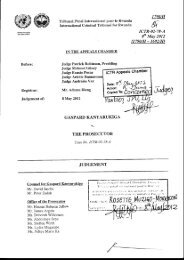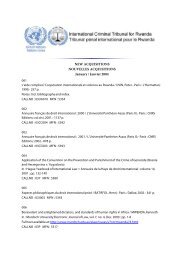Report of Proceedings - International Criminal Tribunal for Rwanda
Report of Proceedings - International Criminal Tribunal for Rwanda
Report of Proceedings - International Criminal Tribunal for Rwanda
You also want an ePaper? Increase the reach of your titles
YUMPU automatically turns print PDFs into web optimized ePapers that Google loves.
thereby improving the effectiveness <strong>of</strong> the international criminal justice system. The aim <strong>of</strong><br />
this colloquium, Mr. Jallow noted, is to identify the constraints and challenges that<br />
international criminal courts face in investigations, prosecution, and administration, as well as<br />
in the detention <strong>of</strong> those who are ultimately found guilty and to explore, in the light <strong>of</strong><br />
experience how such challenges could be effectively overcome.<br />
It is an appropriate moment to take stock <strong>of</strong> how international criminal courts are<br />
per<strong>for</strong>ming, noted Mr. Jallow. The two United Nations ad-hoc tribunals are currently<br />
implementing completion strategies, and the ICC will soon assume the mantle <strong>of</strong> leadership in<br />
the prosecution <strong>of</strong> violations <strong>of</strong> international law. Participants are encouraged to look at what<br />
the ICTY and ICTR have accomplished despite the <strong>for</strong>midable constraints they have faced.<br />
Absence <strong>of</strong> judicial models to follow, a lack <strong>of</strong> resources, problems <strong>of</strong> lo gistics, and a<br />
jurisprudential vacuum are some <strong>of</strong> the constraints. Mr. Jallow suggested that future opinion<br />
would recognise the important contributions the international criminal tribunals will have made<br />
on several fronts. For example, in the elaboration <strong>of</strong> rules <strong>of</strong> practice, procedure and evidence;<br />
the acquisition <strong>of</strong> substantial experience in the conduct <strong>of</strong> international investigations as well<br />
as the selection <strong>of</strong> cases <strong>for</strong> prosecution; the establishment <strong>of</strong> international standards <strong>for</strong> fair<br />
trial; and the enrichment <strong>of</strong> the jurisprudence <strong>of</strong> internationa l law.<br />
Mr. Hassan Jallow stressed, however, that the colloquium should not serve as an exercise in<br />
self-congratulation. Participants must be bold and courageous in identifying the shortcomings<br />
<strong>of</strong> the international criminal justice system so that it can continue to strive <strong>for</strong> greater<br />
efficiency and expedience in the delivery <strong>of</strong> justice. He reminded the audience that no national<br />
legal system, or any legal tradition, could claim to be perfect, even though some have existed<br />
<strong>for</strong> centuries. The international criminal justice system is barely a decade old and is still<br />
finding its way.<br />
Yet the power <strong>of</strong> this system to establish peace and justice has been demonstrated through<br />
the reactions <strong>of</strong> victims and survivors in <strong>Rwanda</strong> and the Balkans. It is clear that many <strong>of</strong> the<br />
violations <strong>of</strong> international humanitarian law committed in these places could not have been<br />
dealt with effectively in national judicial systems. The international penal option must always<br />
be retained, urged Mr. Jallow. But <strong>for</strong> this option to work there must be the fullest international<br />
co-operation in matters relating to resources, investigations, the apprehension and transfer <strong>of</strong><br />
fugitives, witness protection and relocation, and, eventually, the transfer <strong>of</strong> appropriate cases to<br />
national jurisdictions. The current level <strong>of</strong> international support in these matters poses a serious<br />
challenge to the work <strong>of</strong> international criminal tribunals, which is a subject that participants<br />
should collectively address during the colloquium, among other pressing items.<br />
III.<br />
Keynote by ICC Chief Prosecutor Mr. Luis Moreno Ocampo<br />
In his keynote address, Chief Prosecutor <strong>of</strong> the ICC, Mr. Louis Moreno Ocampo<br />
acknowledged the significant milestone that the ICTR has reached with its ten-year<br />
anniversary. Perhaps most important, he noted, is that the experience <strong>of</strong> the court demonstrates<br />
that although humanity can per<strong>for</strong>m terrible acts, it can also learn from those acts. Some <strong>of</strong> the<br />
lessons learned from the work <strong>of</strong> the ICTR are: that a head <strong>of</strong> state can be arrested, indicted<br />
3




